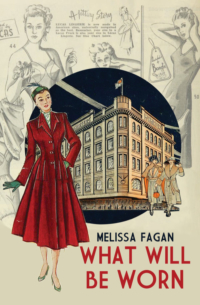‘The longest road out is the shortest road home.’
Its origin is Irish, apparently, not Chinese, at least that’s what Google tells me. According to the Oxford Dictionary of Proverbs, ‘The longest road out is the shortest road home’ means that the detour may turn out to be quicker than the straight route. It means time and effort will eventually be rewarded. If you’re a writer, and your ultimate goal is to publish a book this idea can seem perverse.
But it’s also what keeps you going: the hope that your perseverance will pay off.
My first book, What Will Be Worn, a memoir about my mother’s family – the McWhirters,  who once owned the Fortitude Valley department store – will be published this September. When I pulled that Irish proverb out of a fortune cookie last July, I did not know this yet. All I knew was that I had an almost-finished manuscript, a manuscript which was the result of four or five years of hard work – research, writing, rewriting, editing, rewriting, more research. I knew I was proud of the work, and proud of the writing. After a recent rewrite, it had finally found its form. But by that stage, the manuscript had been rejected by four publishers. My confidence was on the wane.
who once owned the Fortitude Valley department store – will be published this September. When I pulled that Irish proverb out of a fortune cookie last July, I did not know this yet. All I knew was that I had an almost-finished manuscript, a manuscript which was the result of four or five years of hard work – research, writing, rewriting, editing, rewriting, more research. I knew I was proud of the work, and proud of the writing. After a recent rewrite, it had finally found its form. But by that stage, the manuscript had been rejected by four publishers. My confidence was on the wane.
My first manuscript, which had also been the result four or five years of work, four or five years of my life, was never published. It came close – I received an ASA mentorship, and had positive feedback from a publisher, who said she would look at a further draft. This was in 2003. I never completed the next draft. I tried, but lost focus, allowed life to get in the way. For a few years after that, I barely wrote at all.
I had put everything into that first manuscript – my sense of myself as a writer was tied to its success.
So when I slowly, tentatively, made my way back to writing, I started first on shorter pieces – short stories and later essays. In 2011, a story was accepted by an anthology. I received positive feedback from editors and readers, and for the first time felt the thrill of seeing my name attached to something I had written something that was published, public – not just for me. The following year another of my stories was awarded runner-up in a competition. I received a cash prize, and it was published in Overland.
These two publications encouraged me to keep going. I kept writing short pieces, and kept submitting them, even after I started work on the manuscript that would become my book. Often it felt like a distraction. I am not a prolific writer, and can spend months perfecting a story or an essay. In the past seven years, while I worked on my book, I’ve written and published three or four short pieces a year – at most – not enough to build any kind of audience, let alone a career. I often wondered why I did it and whether it was worth it.
Last year, around the time I pulled that message out of the fortune cookie, I was stuck on a rewrite of a review of Robert Dessaix’s The Pleasures of Leisure. It had been a protracted process. I pitched it to The Lifted Brow Review of Books in March, and it was accepted right away, but the book didn’t arrive until early May. I sent my first draft back in June. It was too long. I revised it, and sent it back a few days later.
Three weeks passed, then another two. I reread the essay. Decided it needed more work. I tinkered. I tinkered some more. Something was still missing: I knew what I wanted to say, but I couldn’t work out how to say it. I attempted to withdraw it. Thankfully, the editor didn’t let me; he said he thought it was close. Finally, in early September, I was more-or-less happy with it, and the editor was happy with it, and it was published. I shared it on my Twitter and Facebook. A few people commented on and liked my posts. A shot of adrenalin, which quickly passed. Did anyone actually read it? It was impossible to know.
A few weeks later, I received an email from Barry Scott, publisher at Transit Lounge. He wanted to know if my memoir had a publisher. He had seen my review and agreed with my take (he just happened to be reading The Pleasures of Leisure at the time). I spent the next week madly tying those last loose threads together, turning my almost-finished manuscript into a finished one, or as close as I could get it. I sent it off. A few days after that – six or so years after I had first started writing it – my book finally had a publisher.
I think I understand the meaning of the saying now, and why it spoke to me. Though taking the time out to write stories and essays while working on my book may have felt counterproductive, it also spurred me on during those long, doubt-filled months and years. Even when I was not sure whether I would ever finish my book, let alone find a publisher, it reminded me that I could finish things, that I could – and would – be published. That I could write.
First published in WQ (Writing Queensland) the online magazine of the Queensland Writers Centre in June 2018.
